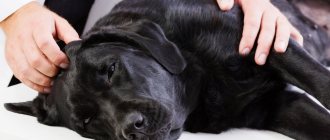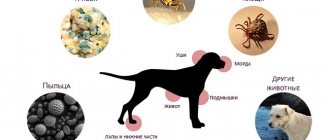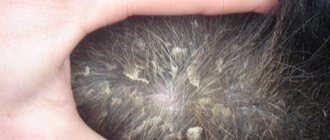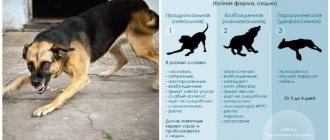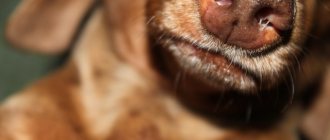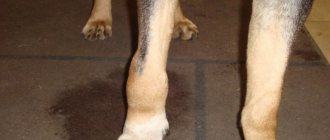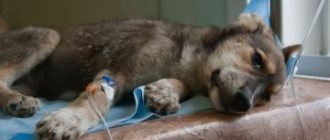Diarrhea and its main symptoms
Dog diarrhea, or diarrhea, is the repeated emptying of liquid feces due to problems with the digestive system.
Every owner faces this problem at least once. Sometimes a dog’s diarrhea ends quickly, and sometimes it lasts for several days or even weeks, causing a lot of inconvenience to the pet and its owner.
If the attack of diarrhea was a one-time occurrence, there is no particular cause for concern, but prolonged loose stools are considered a reason to consult a veterinarian. The level of danger increases the appearance of blood, mucous masses in the stool, as well as the lethargy of the pet. Diarrhea is often accompanied by vomiting and fever.
The causes of diarrhea in dogs can often be determined by the color of the stool. Treatment is symptomatic and takes place mainly at home. To prevent dehydration of the body, plenty of fluids and adsorbent drugs are prescribed. In serious cases, antibiotics are used - they are prescribed by a veterinarian.
Primary diagnosis
As a rule, the color of an animal’s stool depends on the composition of the food eaten the day before. If, in addition to the liquid consistency, the feces acquire an unusual color, this may indicate the presence of a pathological process in the body:
- Yellow – indigestion, food poisoning, liver dysfunction, helminthiasis. When a change in the color of stool is accompanied by lethargy and a drop in body temperature, we can talk about infection with parvovirus enteritis.
- Red – blood entering the intestinal contents as a result of injury, ingestion of a foreign body, or acute infection.
- Black – gastric bleeding, pathologies of the duodenum.
- White – hepatitis, blockage of the bile ducts.
- Green – fermentation process as a result of processing poor quality food. The presence of foam and mucus may indicate dysbiosis or acute intestinal infection.
Vomiting of bile (greenish-yellow foam) is observed in the case of diseases of the duodenum and liver, as well as with indomitable spasms of an empty stomach as a result of severe pathologies. The admixture of blood in the rejected masses may be a sign of trauma to the oral cavity, esophagus or stomach, ulcers, helminthiasis, certain respiratory diseases or concussion. Vomiting and diarrhea in a dog accompanied by an increase in body temperature almost always indicates the presence of a viral infection.
By the color of stool, you can preliminarily determine the causes of health problems in an animal.
Frequent bowel movements without complications
Unpleasant consequences of poisoning, infections, and an unbalanced diet can be loose stools in a dog. It is often uncomplicated by other symptoms, but still causes anxiety for the pet.
Factors of occurrence
If your pet defecates more than four times a day with liquid feces, it is diagnosed with diarrhea. It can be caused by simple factors:
- spoiled food;
- changing the type of feeding;
- poor quality feed;
- food allergies;
- binge eating;
- infection with intestinal parasites.
In such a situation, it is important to find out the cause and quickly eliminate the source of the problem.
Treatment
First, it’s worth adjusting the diet: remove everything that is stale and switch the animal to natural food with fastening elements. This is a low-fat meat broth with rice. It is acceptable to eat turkey or beef with steamed vegetables.
If you are sure that the dog has not eaten stale or inappropriate food, has not been poisoned and has allergies, you need to start specific treatment.
First of all, you need to try not to feed the dog for a whole day. The amount of water you drink is significantly increased - this will prevent dangerous dehydration of the body.
Adsorbent drugs that remove toxins have proven themselves well. Prolonged diarrhea in a dog is treated with antibiotics, used strictly according to the instructions. If worms become a result of liquid feces, then anthelmintic drugs are prescribed.
Treatment of diarrhea
Treatment for diarrhea depends on what additional symptoms occur with the disorder. If your pet only has diarrhea, but is otherwise alert, active and cheerful, then the cause of the disorder may be poor quality food. In this case, the owner of the four-legged animal can independently carry out preventive procedures.
To do this, just give your dog a couple of tablets of activated carbon in the morning and a couple of tablets in the evening. Read about how to give your dog the pill yourself.
Enterosgel, a detoxifying agent for poisoning, also helps (dilute a teaspoon of the drug in half a glass of warm water and inject it into the mouth using a large syringe without a needle). Enterosgel should be given three times a day, for about 2-3 days.
In this case, you should skip one or two feedings, not forgetting that there should be enough water. But this may be so - the condition does not improve, and the dog’s diarrhea continues. Moreover, it is accompanied by weakness, lethargy, inhibited reactions, change in the color of feces and vomiting. In this situation, you urgently need to run to the veterinary clinic.
Here, drug treatment is already necessary: the use of antibiotics, IV drips, and so on. To help your doctor quickly identify the cause, remember the color, smell and consistency of your stool. Well, it’s better if you immediately take some feces into a jar for analysis.
Diarrhea accompanied by vomiting
It is more difficult to cope with the situation when the dog’s diarrhea is complicated by vomiting. There is no need to worry about a single cleansing of the stomach, but multiple vomiting, removing fluid and undigested food residues combined with gastric mucus, becomes a reason for an immediate visit to the doctor.
When appears
Diarrhea with vomiting in a dog can be due to:
- excessive food consumption;
- stale food;
- unbalanced diet;
- food or other poisoning;
- swallowing a foreign object;
- prolonged inhalation of unknown chemicals;
- bloating, accompanied by shortness of breath and excessive salivation;
- helminthiasis – infection with worms.
However, the most dangerous cases of repeated frequent bowel movements with vomiting can be infectious viral diseases. For example, distemper or parvovirus enteritis occurs in puppies from 2-6 months. Due to the formation of numerous erosions on the intestinal mucosa, the animal stops eating, drinking and quickly fades away. Against the background of the disease, a decrease in temperature occurs, as well as dangerous changes in the functioning of the heart. Without timely help, the death of a pet occurs.
Rotavirus and coronavirus occur in individuals of different ages, but symptoms in young animals are more severe. Dehydration as a result of loss of electrolytes is dangerous for the health of animals, but the use of special drugs can cope with the disease within seven days.
Also, vomiting with diarrhea in four-legged animals of any age is caused by an adenovirus. The known symptoms include increased temperature, inflammation of the mucous membrane of the four-legged friend’s eyes, and enlarged liver. With proper care and use of medications, the disease goes away within 14 days.
Treatment
For short attacks, the same measures are usually sufficient as in cases with uncomplicated diarrhea: dietary restriction, drinking plenty of fluids, and using adsorbents. To stop spasms, use no-shpa and papaverine as prescribed by a doctor. A strengthening diet maintained for several days helps a lot.
Vomiting in combination with liquid feces washes out necessary substances from the body, so it is recommended to administer solutions that replenish the animal’s water-salt balance. The damaged microflora is restored by introducing fermented milk products and special probiotics for animals into the diet.
Repeated cases of bowel movements and vomiting are signs of a serious illness or serious poisoning, which tests will help identify. Your veterinarian can prescribe medications for infections, viruses and parasites in the intestines. In case of poisoning, gastric lavage will be effective.
Causes of diarrhea in dogs
- Incorrect nutrition, its sudden change, intolerance to some components of dry food, allergies.
- Poisoning (an animal swallowed a foreign object, garbage on the street).
- Diseases of the kidneys, liver, pancreas.
- Stress. Moving to another city or going to the doctor frighten the animal, which leads to digestive problems for several days. Often everything goes away on its own.
- Presence of neoplasms in the abdominal cavity.
- Fungal infections (coccidiosis, trichomoniasis, giardiasis).
- Infection of the body with parasites. At the same time, sudden weight loss begins.
- Infectious diseases (plague, coronavirus, salmonellosis).
Articles on the topic
- Pulmonary emphysema - what is it: symptoms and treatment
- How to lose 3 kg in a week - effective ways
- Laser tattoo removal
Loose stools with blood or mucus
If there is blood and mucus in the dog's excrement, then immediate consultation with a specialist is required. Only a veterinarian can prescribe the necessary medications and treat diarrhea in dogs in such cases.
Possible reasons
As a rule, a blood test and examination of the pet help to accurately determine what caused the disease. In difficult situations, feces are taken for examination, and x-rays of internal organs are also taken.
Possible causes include:
- mechanical damage to the intestinal walls from a swallowed foreign object;
- pancreatitis;
- open stomach ulcer;
- dysbacteriosis;
- intestinal parasites;
- infection;
- tumors in the rectum;
- enteritis;
- hemorrhagic leptospirosis.
Any of these factors can only be identified by an experienced specialist, who needs to be contacted in case of repeated cases of diarrhea accompanied by bleeding.
Treatment
Complicated diarrhea cannot be ignored because it can cause serious harm to the health of your pet. If frequent bowel movements have stopped on their own, a visit to the clinic will still not be superfluous. The examination will help confirm the diagnosis and suggest how to treat diarrhea in a dog at home.
When poisoning caused by various reasons is detected, the stomach is washed in the hospital, adsorbents are given, and in difficult situations, antibiotics are prescribed in the form of injections, tablets or droppers. When diagnosing tumors, surgery is performed.
In a dog, bloody diarrhea due to dysbacteriosis is usually a consequence of poor nutrition. In addition to prescribed treatment recommendations, the veterinarian will help you adjust your diet to avoid recurrence of the disease. Among the drugs used are probiotics, antiseptics and immunomodulators.
The removal of intestinal worms is facilitated by antiparasitic drugs that suppress their development and relieve symptoms. Such medications are given based on the weight of the pet.
Infections of the gastrointestinal tract, bacterial and viral diseases require long-term treatment with antiviral drugs and antibiotics strictly as prescribed by the doctor.
Causes of diarrhea
Diarrhea in a dog can be caused by a number of reasons. But, as a rule, the two main ones are unhealthy diet and food poisoning.
Poor nutrition:
- Sudden change of food. For example, from dry food to natural food and vice versa.
- Poor quality or spoiled products.
- Unsuitable foods for dogs. Read what foods can be given to four-legged animals and which cannot.
- Overfeeding.
Food poisoning. Diarrhea can begin after the dog picks up something on the street or eats spoiled food. Never leave food in a bowl that your pet hasn't finished eating. Food may spoil. After eating spoiled food, the animal can become poisoned. If the dog does not eat within 10-15 minutes after you have given him a bowl of food, put the container in the refrigerator and give the same food at the next scheduled feeding.
Diarrhea can also be caused by:
- Entry of foreign objects into the digestive tract.
- Allergy.
- Avitaminosis.
- Lack of microelements in the animal's body.
- Damage to the walls of the stomach and intestines by foreign objects.
- Gastric juice deficiency.
- Indigestion.
- Helminths (worms).
- Dysbacteriosis.
- Infectious diseases.
- Chemical poisoning.
- Various diseases of the gastrointestinal tract, such as pancreatitis.
Unusually colored excrement
The color of a quadruped's stool depends on the food it eats. In another situation, it is worth finding out why the changes in the color of the feces occurred.
Possible factors
So, a black color can indicate dangerous bleeding from the duodenum or stomach - or be a common consequence of using activated charcoal or iron-containing drugs.
Yellow feces are a consequence of liver dysfunction, indigestion, or the presence of worms. If yellow stool causes a drop in temperature and a strong unpleasant odor, then most likely it is parvovirus enteritis.
Rarely does stool appear white. This color indicates the absence of bile in them due to blockage of the bile ducts. Blood impurities indicate the presence of intestinal injuries, severe inflammation or viral infections in the animal.
The green color of feces is associated with the process of fermentation or rotting in the dog’s intestines due to spoiled food. It also becomes a symptom of dysbiosis, gastrointestinal diseases, and the development of infections.
Treatment
What to give a dog for diarrhea of an unusual color is decided by a specialist after conducting an examination and studying the test results of the sick animal. The most commonly prescribed medications are conventional medications that are suitable for all types of intestinal disorders.
Having established the reason for the coloring of excrement in an uncharacteristic color, the veterinarian gives certain recommendations. There are a number of common uses:
- food restriction for at least a couple of hours, and preferably for a day;
- menu adjustments;
- drinking small portions;
- use of adsorbents.
Following the recommendations of a veterinarian is important not only for curing a four-legged animal. Independent selection of medications and the use of traditional methods can harm your pet. And untimely access to the clinic leads to late diagnosis of serious diseases.
First aid
If the dog vomits repeatedly, the owner should try to stop the vomiting himself. The pet is given sorbents: activated carbon, Smecta, Enterosgel.
For an adult dog, food intake is excluded for a day. The puppy can withstand a hungry pause for 6-12 hours.
If possible, No-shpa or Cerucal is administered intramuscularly. These drugs eliminate the urge to vomit. Papaverine will relax the intestinal muscles, relieving spasms.
At this time, the dog can only be given water. To prevent dehydration, Regidron and Hydrolyte are given. The animal is often given water in small portions. You can give your dog decoctions of medicinal herbs: chamomile, St. John's wort, etc.
On the second day, if the condition is stable, add fermented milk products, homemade rice water, and low-fat chicken broth. On the third or fourth day, a boiled chicken egg, lean, steamed meat are introduced into the diet. Within a week, probiotics (Linex, Bifiform, Lactobacterin) are given to restore the intestinal flora.
If diarrhea and vomiting do not go away within three days, you should contact your veterinarian. Go to the doctor immediately if:
- the dog hides from the light, avoids noisy places (this may be a symptom of distemper - a serious infectious disease);
- there is an admixture of blood and/or bile in the diarrhea;
- the dog is lethargic, constantly lies in one place, refuses walks and food;
- if constant rejection of the contents of the intestines and stomach leads to dehydration;
- new signs of illness appeared - convulsions, shortness of breath, loss of balance, etc.
You should also contact the clinic immediately if your puppy experiences vomiting and diarrhea. Before the age of three months, fatal dehydration can occur within 24 hours.
Caring for a sick dog
Unfortunately, the owner of an animal is not always able to quickly respond to a problem and consult a veterinarian. Therefore, there is a need to use medications intended for humans. What medicine should I give my dog for diarrhea at home so as not to harm it?
Medicines and folk remedies
The owner chooses how to treat the pet himself, but each individual case requires consultation with a specialist.
The most popular medications for diarrhea in dogs are:
- Activated carbon;
- Enterosgel;
- Smecta;
- Enterofuril;
- Furazolidone;
- Loperamide;
- Levomycetin.
An extensive list does not mean that you can uncontrollably stuff your pet with these medications. Herbal preparations from St. John's wort, oak bark, and chamomile should also be used only after consultation with a specialist. The veterinarian will tell you how to calculate the dosage based on the weight, size, breed, age and condition of the dog. Some medications can cause serious allergies in four-legged animals, and in case of overdose, poisoning and convulsions. Therefore, independent treatment is contraindicated.
The only thing you can do at home when your dog has diarrhea is to adjust the diet and increase the amount of fluids.
Diet food
After diarrhea, the dog begins to feel hungry, but it is correct not to feed it for the whole day. The main thing at this time is to adhere to the drinking regime, giving the animal plenty of clean bottled water. After a day, it is recommended to keep the dog on a gentle diet for several days.
What to feed a dog with diarrhea? It is useful to give rice boiled in water or give the animal a thick rice broth. If diarrhea is over, then to maintain strength, give beef or chicken broth, low-fat fermented milk products, boiled chicken breast. Meals should be fractional and portions should be small.
Associated signs of the disease
A chronic process can be manifested by periodic vomiting over a long period of time, for example, daily vomiting once a day for 14 days or 2 times a month.
Watery diarrhea is often acute in nature, since dehydration and death quickly sets in, that is, it is unlikely to meet a dog suffering from profuse diarrhea for a month and at the same time standing firmly on its paws.
Additionally, other symptoms may occur that will help in diagnosis:
- Pain in the abdominal area.
- Nausea. May manifest as drooling and frequent swallowing.
- Hyperthermia during infectious processes and the presence of severe inflammation.
- Decreased activity.
- Refusal to eat and drink or a reduction in these needs.
- With severe pain, increased vocalization (the dog screams loudly).
Pay attention to this store. He sells good dog products
When to contact a veterinarian
In most cases, it is enough to consult a specialist over the phone - if the diarrhea is not complicated by anything, you can cope with it on your own. The doctor will tell you what to do at home for diarrhea in dogs. If he recognizes something threatening in the symptoms described, he will invite you and your pet for an examination.
If your dog's diarrhea has not stopped for 4-5 days, and you have already tried everything, you need to go to the clinic. The animal needs IV drips to prevent it from dying from dehydration. Veterinarians will also examine the four-legged patient and provide more serious care.
Diarrhea in a puppy should not be treated at home - especially if the baby is less than 6 months old. A young body is unable to resist even a mild illness, so seeking help is mandatory. Also, diarrhea in puppies often warns of serious viral diseases that need to be treated in the first few hours of manifestation.
You should drop everything and go to the doctor if your dog’s diarrhea is accompanied by repeated vomiting, lethargy and loss of appetite, convulsions and loss of consciousness, constant trembling, elevated temperature - everything can indicate serious illnesses. In such cases, treating diarrhea in a dog at home is unacceptable, since stool upset is only a secondary problem. But the primary care should be handled by a specialist, that is, a veterinarian.
Medicines for people to help with diarrhea in dogs
Any medications should be given to an animal carefully, after consulting a veterinarian. The specialist will advise the appropriate remedy and select the dosage.
- Homemade eclair recipe with photo
- Condylomas in women - what they are and how to treat them
- What do men like in a woman and why. What kind of women do men like?
Smecta
This adsorbent drug binds gases and promotes the removal of toxins, bacteria, and viruses from the digestive tract. For diarrhea in a dog, it is recommended to dissolve 10 ml of the drug in water and administer it into the animal’s mouth in three doses. It is advisable to maintain an interval of 1.5 hours between applications of smecta. Price – from 134 rub.
Activated carbon
This cheap natural sorbent safely removes toxic substances and gases from the body and improves peristalsis. When treating diarrhea, a dog is prescribed 1-2 g in 3-4 doses per day. The feces become dark in color, but this does not worsen the animal’s condition. The tablets can be ground into powder, shaken in water and poured into the throat using a syringe. In case of severe poisoning, activated carbon is used to wash the intestines. Price – from 5 rub.
Enterofuril
A drug based on nifuroxazide can quickly improve the animal’s condition and destroy infectious agents. Available in the form of capsules or suspension. When treating a dog, it is advisable not to exceed a dose of 100 mg, using the drug three times a day. Duration of use – 2-3 days. Price – from 262 rub.
